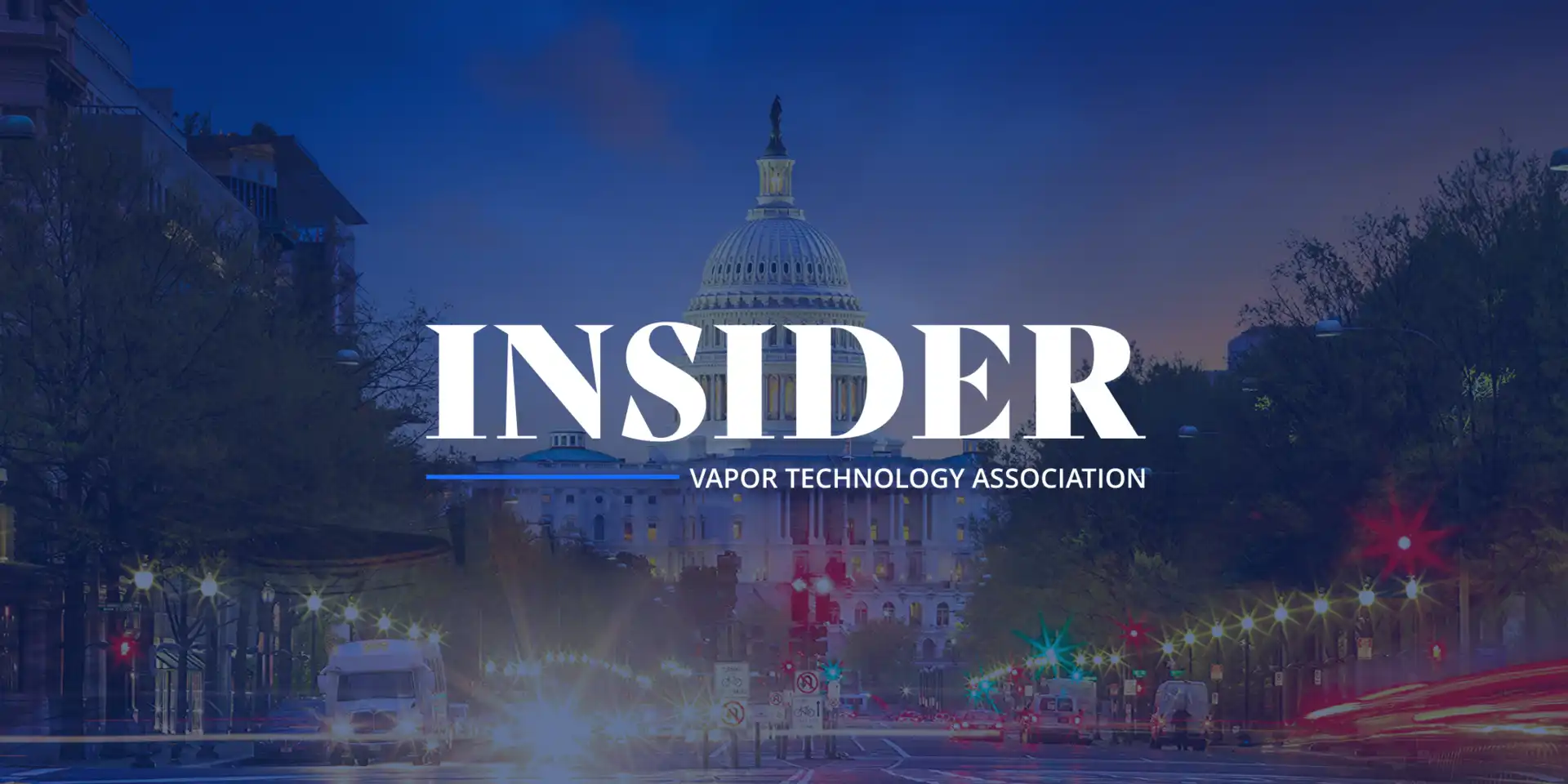VTA Insider Jan 2023 – Smoking vs Vaping, Vaping Info and Regulations.

Published on February 6, 2023
VTA Insider keeps you informed of critical issues impacting the nicotine products industry both in Washington, DC and in the states. We will cover regulatory developments, legislation, news of note and other industry insights. VTA will also share our analysis of what we as an industry need to do to grow and prosper.
Let’s Dive In.
1 big thing: VTA meets with King…again

The big picture: Kicking off the New Year, on January 10, 2023, VTA leadership and select board members met with CTP Director Brian King and other leadership at the Center for Tobacco Products (CTP) to discuss top agenda items for the year. This was the second meeting that VTA has had with King in the last four months.
Top takeaway: Director King acknowledged the fact that youth e-cigarette use continues to decline but was ambiguous on the reshaping of CTP policy regarding adults, noting they are considering how to address the Reagan-Udall recommendations and looking to engage more with stakeholders.
Remember, Reagan-Udall told CTP to: “resolve how to weigh the public health benefits of adults who use ENDS that will quit smoking combustible tobacco products against the potential public health harms to youth who use e-cigarettes.”
The rest of the agenda: VTA focused on the most pressing issues impacting our members and the industry including:
- Implementing Reagan-Udall Recommendations
- Enforcement Discretion for Non-Tobacco Nicotine
- Need for an Objective APPH Test
- Industry Stakeholder Engagement
VTA presses CTP on clarifying enforcement discretion policy

The “million dollar” question: CTP has historically allowed all tobacco products with pending PMTAs to remain on the market, subject to FDA’s enforcement discretion, but in the past few months has been making confusing statements particularly with respect to non-tobacco nicotine products. Following up on VTA correspondence from early November 2022, we asked Director King: “Has CTP had changed its well-established enforcement discretion policy for non-tobacco nicotine products only?”
What we said: It’s extremely important that we get clarity on this question so all market participants understand CTP’s position and so that companies are not able to misrepresent CTP’s position for their own benefit.
- For years, CTP has used enforcement discretion to allow all tobacco products with pending PMTAs to remain on the market and that policy should be consistently applied to tobacco and non-tobacco nicotine products alike.
- Some companies have been attempting to confuse retailers and dissuade them from carrying synthetic nicotine products by claiming that CTP uses enforcement discretion only for tobacco-dervied nicotine products and not for synthetic nicotine products.
- Nothing in the new law limited CTP’s enforcement discretion – in fact, CTP has been exercising that discretion – and CTP would never unilaterally limit its own discretion.
What they’re saying: During the meeting Director King indicated that had been no policy change with respect to CTP’s use of enforcement discretion.
- But, Director King went on to say that there was a difference between enforcement discretion and enforcement prioritization.
- King promised promised a formal letter soon from CTP in response to VTA’s questions to clarify CTP’s position.
King to VTA: FDA has no enforcement discretion policy for TDN or NTN products

The big picture: CTP has exercised enforcement discretion for years. CTP has asked courts not to limit its enforcement discretion. CTP has explained its actions or inactions based on enforcement discretion.
Why it matters: CTP has consistently used its enforcement discretion to allow products under PMTA review to remain on the market pending a final PMTA determination. Manufacturers, distributors and retailers have relied on CTP’s statements to continue selling less harmful vaping products. Heck, CTP has been criticized by anti-harm reduction forces for using enforcment discretion.
About Face: On February 2, 2023, VTA received the formal response letter promised by Director King in which he clarified that:
- TDN products are not being treated differently than NTN products.
- CTP has not been using enforcement discretion for tobacco-derived nicotine products or synthetic nicotine products.
- In fact, CTP does not even have a policy on enforcement discretion.
- All products, regardless of whether they include tobacco-derived nicotine or synthetic nicotine, are illegal and cannot be sold until their PMTAs have been authorized.
Go deeper: While CTP acknowledged that FDA originally said it would use enforcement discretion, that changed. Here is how Director King recasts what CTP has been doing:
“Accordingly, your letter’s assertion that FDA is “us[ing] its enforcement discretion to allow . . .products to remain on the market” while they undergo review is not correct. On the contrary, as the guidance reiterates, all illegally marketed TDN e-cigarette products are subject to FDA enforcement. The same principle applies to NTN products; specifically, all illegally marketed NTN products are subject to enforcement.”
“FDA cannot affirmatively allow or permit the unlawful marketing of tobacco products, including TDN and NTN e-cigarette products; as the above statements reflect, all illegally marketed products are subject to FDA enforcement, such a seizure, civil money penalty, or injunction. Moreover, FDA has not adopted a broad policy of enforcement discretion with respect to TDN or NTN e-cigarette products that lack the required premarket authorization.”
Why Now?
- Sure, VTA has been presssing CTP on clarifying the question of enforcement discretion for months.
- But, we can’t help noting that CTP’s 2-page letter (three months in the making) was received just one day after Sen. Richard Durbin (D-IL) and other Senators issued another press release and sent a letter to HHS Secretary Xavier Becerra blasting CTP for its, yes, “exercise [of] enforcement discretion,” and demanding “This enforcement discretion should have ended years ago. It must end today.”
- At least now we know that FDA is not using enforement discretion for any nicotine-containing product.
VTA to FDA on Reagan-Udall: Need to Pull It Together, Together

One big thing: The Reagan-Udall report raised a number of critical issues regarding CTP’s handling of tobacco regulation that demand immediate attention and immediate industry engagement. VTA learned that CTP will formally respond to the Reagan-Udall report in mid – February. With that in mind, in our January conversation with Director King, VTA highlighted the Reagan-Udall recommendations that mirrored VTA’s own recommendations:
- CTP needs a strategy: Reagan-Udall said that CTP has no strategic plan and “must create [a strategic plan] that identifies the CTP’s strategic objectives and plots an operational roadmap of the steps CTP will take over the next five years to achieve those objectives.” VTA strongly supports this recommendation and noted its agreement with Reagan-Udall that the path to resolving many of the CTP’s self inflicted problems starts with establishing the scientific and policy framework for tobacco harm reduction.
- CTP needs to establish what is APPH: Reagan-Udall made clear that CTP must “explain how FDA is interpreting the [appropriate for the protection of public health] APPH standard” and how it is weighing “the public health benefits of the percentage of adults who use ENDS that will completely quit smoking … against the potential public health harms [to] youth.” VTA noted that APPH evaluations were being subjectively decided in conflict with the science. VTA offered to work with CTP on an objective process for ensuring that APPH decisions are made without political or outside interference.
- CTP must advocate clearly for harm reduction: Reagan-Udall noted that “CTP lacks consistent implementation of its own policies, particularly with respect to harm reduction” which undercuts CTP’s mission. CTP has acknowledged the continuum of risk but has no clear policy or strategy on harm reduction. VTA emphasized the need for a clear APPH standard and clear messaging from FDA on harm reduction.
- CTP must be transparent: VTA has consistently raised concerns regarding the opaque operations of the CTP. Reagan-Udall’s review highlights a shifting decision-making process, lack of clarity on responsibilities, and impact of extreme external pressures. Transparency in decision making is as imporatnt as transparency and engagement in the policy process. We urged CTP to create opportunities for communication outside of the rule making process and recognize that companies which are spending millions of dollars are acting in good faith and need to be engaged early.
What’s next: Based on Director King’s statements and promises, we should expect a much higher degree of stakeholder engagement, including VTA and other industry engagement, with CTP on the critical issues raised by Reagan-Udall. However, it is unclear how FDA/CTP will choose to address Reagan-Udall’s serious criticisms. It is equally unclear whether CTP will tackle the problems with enough force to change CTP’s trajectory away from propping up cigarettes and toward replacing them with less harmful vaping and modern oral products.
Progress in The Courts

The big picture: FDA CTP is embroiled in litigation throughtout the country which is testing whether FDA’s “fatal flaw” approach to PMTAs and its implementation of post-application testing prerequisites violate the law. Those cases, pending in various federal appellate courts, could end up in conflict thus paving the way for SCOTUS review.
One important case: Wages & White Lion v. FDA, is pending in the 5th Circuit. There, the petitionr originally secured the “suprise switcheroo” opinion which heavily criticized the FDA for changing the application requirements after the fact and imposed a preliminary injunction barring the FDA from enforcing its MDO against Wages & White Lion. However, in a split-decision (2-1), the final panel agreed with the FDA and denied the appeal.
5th Circuit Rehearing: Wages & White Lion asked all 9 judges of the 5th Circuit to review the case and that request was granted so the full 5th Circuit panel will now make the court’s final decision. VTA filed an amicus brief in support of the request for a rehearing en banc, provinding the court with the findings of its experts’ analysis of the severe economic ramifications of the FDA’s flavor ban.
FDA’s Illogical VUSE on Menthol

The big picture: Last month, FDA issued market denial orders for two VUSE menthol PMTAs filed by R.J. Reynolds. You can read FDA’s statement here. This after FDA denied LOGIC’s menthol vape PMTAs, filed by JTI, last year. The tobacco giant quickly obtained an injunction from a federal court to bar enforcement of the FDA’s decisions.
Why it matters: It is safe to say that we have entered the unfortunate reality where FDA is intent on treating menthol products in the same dismissive manner in which it has treated all other flavored vaping products to date. It appears that no amount of science will be sufficient for FDA leadership and that in the absence of menthol vapes, former smokers will become smokers again.
Stay tuned in with us for lots of new developments and make sure your friends and colleagues are signed up to receive our news and information.
Got questions? If you have any questions about the issues we have covered, have suggestions for content, or how you can support our efforts, please feel free to contact us at press@vaportechnology.org.